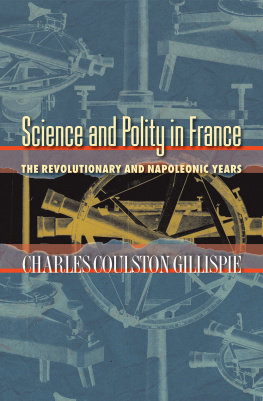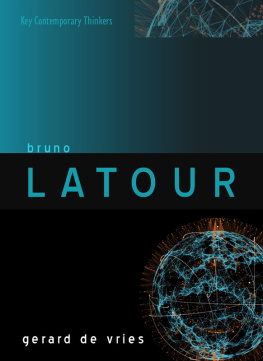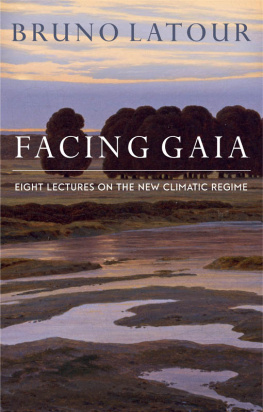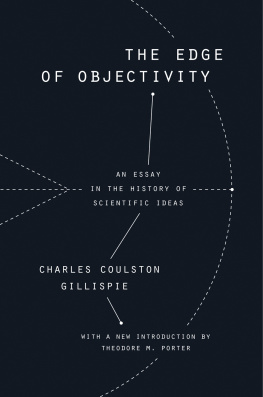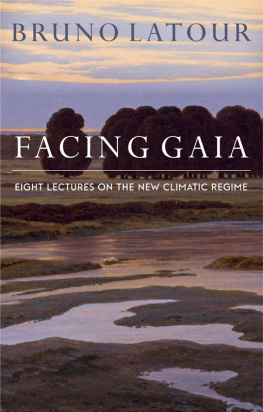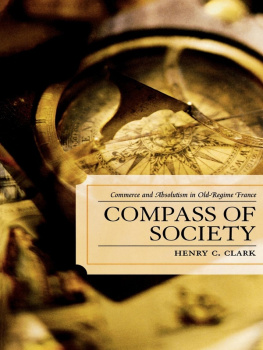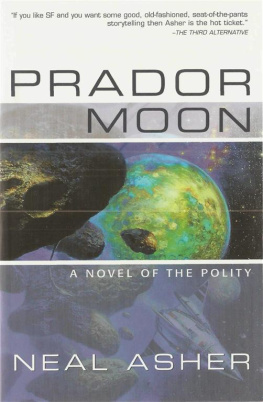SCIENCE AND POLITY IN FRANCE:
THE REVOLUTIONARY AND NAPOLEONIC YEARS
Also by the AuthorBOOKS
Genesis and Geology. A Study in the Relations of Scientific Thought, Natural Theology, andSocial Opinion in Great Britain,17901850. 1951. 2nd ed., with a foreword by
Nicolaas Rupke, 1996.
The Edge of Objectivity: An Essay in the History of Scientific Ideas. 1960. 2nd ed., 1990.
Lazare Carnot, Savant. 1971.
Science and Polity in France at the End of the Old Regime,
with the collaboration of A. P. Youschkevitch. 1980.
The Montgolfier Brothers and the Invention of Aviation,17831784, with a Word on theImportance of Ballooning for the Science of Heat and the Art of Building Railroads. 1983.
Pierre-Simon Laplace: A Life in Exact Science, with the collaboration of Robert Fox and Ivor Grattan-Guinness. 1998.
PUBLISHED LECTURES
Les Fondements intellectuels de lintroduction des probabilits en physique. Confrences du Palais de la Dcouverte, Paris. 1962.
The Professionalization of Science: France17701830, Compared to the United States,
19101970. The Neesima Lectures, Doshisha University, Kyoto, 1983.
EDITIONS
A Diderot Pictorial Encyclopedia of Trades and Industry: Manufacturing and the TechnicalArts in Plates Selected from the Encyclopdie of Denis Diderot. 2 vols. 1959.
Dictionary of Scientific Biography. 16 vols. 197080.
Monuments of Egypt, the Napoleonic Edition: The Complete Archaeological Plates from LaDescription de lgypte. Co-edited with Michel Dewachter. 2 vols. 1987.
SCIENCE AND
POLITY IN FRANCE
THE REVOLUTIONARY
AND NAPOLEONIC
YEARS

Charles Coulston Gillispie

PRINCETON UNIVERSITY PRESS
PRINCETON AND OXFORD
Copyright 2004 by Princeton University Press
Published by Princeton University Press, 41 William Street
Princeton, New Jersey 08540
In the United Kingdom:
Princeton University Press, 3 Market Place, Woodstock,
Oxfordshire OX20 1SY
All Rights Reserved
Library of Congress Cataloging-in-Publication Data
Gillispie, Charles Coulston.
Science and polity in France : the revolutionary and Napoleonic years / Charles Coulston
Gillispie.
p. cm.
Includes bibliographical references and index.
eISBN: 978-1-40082-461-8
1. ScienceFranceHistory. 2. Science and stateFrance. I. Title.
Q127.F8G53 2004
509.44dc22 2003055451
British Library Cataloging-in-Publication Data is available
This book has been composed in Adobe Garamond
Printed on acid-free paper.
www.pupress.princeton.edu
Printed in the United States of America
1 3 5 7 9 10 8 6 4 2
Toujours et jamais mon amie
E R C G
CONTENTS

ABBREVIATIONS


SCIENCE AND POLITY IN FRANCE:
THE REVOLUTIONARY AND
NAPOLEONIC YEARS
INTRODUCTION

The modern period in the history of both politics and science opens out of the quarter century of the French Revolution and its Napoleonic sequel. In both respects the relative importance of developments in France then reached a maximum in ways that were reciprocally reinforcing although neither one, in my view, was reducible to the other, nor were they to any further sector of historical change. In an earlier volume treating the last decades of the old regime, I ventured to identify and analyze loci of interaction between politics and science. The present purpose is to continue that approach throughout the time when the density of the intersections increased to a degree that is characteristic of modern polity in general.
Let me state first the exordium concerning politics.
The issues defined by the French Revolution were paramount in the politics of every country in Europe throughout the nineteenth century and into the twentieth. In France the central thrust was toward democratization encased in a nationalism purporting to be cosmopolitan. In other countries, the order was reversed, owing in part to revulsion from French domination. Whichever the sequence, the imperative that governed feelings was assertion of the equal worth of every citizen sharing in, or confronted with, the only legitimate power, the power of the state, enormously augmented. In the exercise of government, bureaucracy displaced particularism, while the appetite of the state for power grew by what it fed on, filling and overflowing the vacuum left by the dissolution of all the intermediate powers, whether local, regional, juridical, clerical, or economic, which had governed life in its many aspects while buffering the subject from direct exposure to the authority of the sovereign.
Nowhere did resolution of the issues of the Revolution prove to be a simple matter of liberalism prevailing over reaction, and certainly not in France. The Terror of 179394 and Napoleonic despotism were no less intrinsic to its inwardness than the Declaration of the Rights of Man and Citizen. The violence of the former pertained to means and the principles of the latter to ends, although the two could become conflated, as in the minds of those who thought like Robespierre. For the French Revolution was as much the progenitor of modern totalitarianism as of modern democracy. Both in totalitarian and in democratic states the constant preoccupation of government is its immediate relation to the whole people. Absolute monarchs of the old regime would have found the practices of twentieth-century dictators no less unthinkable than the liberties of twentieth-century democracy.
Let me in the second place state the exordium concerning science.
In Europe generally, the French establishment predominated throughout the half-century and more of which the Revolution was the centerpiece, from the 1770s through the 1820s. The chemical revolution, analytical and celestial mechanics, the rigorization of the calculus, the mathematicization of physics, botanical systematics, comparative anatomy, experimental physiology, clinical medicineFrench scientists were the prime movers and French institutions the initial loci of all these new departures along the road of modernization.
It would appear, indeed, that for a time the vigor of high culture in France had passed from arts and letters into science. In a graph of the importance of French literature, of French art, of French music, the quarter century between 1789 and 1815 would show a dip, not to say a trough, between the peaks of the Enlightenment and of the nineteenth century. What writers in that interval are still read for the quality of their language? Two, Andre Chenier and Chateaubriand. What painters stand out? Two again, David and, later, Ingres. What composers wrote music that lives, other than the Marseillaise? One, Cherubinian Italian whose name has failed to find its way into the
Next page
